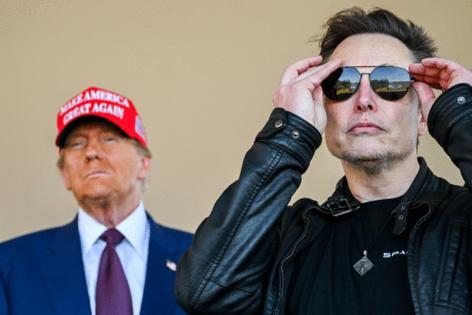Editorial: The people vented, making oligarchs even richer
Published in Op Eds
If voters delivered any certain message on Nov. 5, it’s that they were angry enough not to take it any longer.
There’s much to be angry about, but it’s harder to tell just what voters were protesting.
To some so-called experts, they were angry at the “elites,” narrowly defined as people with college degrees and liberal social views on gender and religion who supposedly control the Democratic Party.
The truth is, the elites who actually run our country care little about social issues. What concerns them is the wealth they control, and how to increase it.
That was the point of a major study 10 years ago which documented that we had become an oligarchy run by “economic elites and organized groups representing business interests.”
When their interests and those of the general public coincide, both often get what they want. But when they clash, the wealthy often prevail.
Money talks, always
Authors Martin Gilens of Princeton and Benjamin Page of Northwestern compared a large database of public opinion polls to political outcomes.
“Not only do ordinary citizens not have uniquely substantial power over policy decisions; they have little or no independent influence on policy at all,” they wrote. “When the preferences of economic elites and the stands of organized interest groups are controlled for, the preferences of the average American appear to have only a minuscule, near-zero, statistically non-significant impact upon public policy.”
Writing two years later to rebut their critics, the authors offered some interesting examples.
“On most aspects of national defense, environmental policy, drug policy and education, for example, the views of the affluent and the poor are nearly identical,” they explained. “Even on redistributive economic policies, there is often more agreement than one might expect. Lower and higher income Americans, for example, are equally supportive of unpaid family leave laws and equally opposed to a national sales tax.”
However, they added, “Middle-income Americans, for example, are more likely to support raising the minimum wage or indexing it to inflation; increasing income taxes on high earners or corporations; and cutting payroll taxes on lower income Americans. And they’re more likely to be opposed to tax cuts for upper-income individuals, spending cuts in Medicare, and roll-backs of federal retirement programs.”
Gilens cited other examples in an e-mail to the Sun Sentinel Editorial Board.
“Lower and higher income Americans were often in agreement on military policies (e.g., in support of invading Afghanistan and in opposition to giving aid to the Sandinistas). But they often disagreed on free trade (e.g., NAFTA, GATT), where the affluent supported free trade agreements while low-income Americans opposed them,” he wrote.
Gross income inequality
Most Americans don’t need statistics to know that something is fundamentally wrong.
People struggle to put food on the table. The federal minimum wage hasn’t been raised in 15 years, and at $7.25 an hour is worth only 40 cents of every dollar of value at its peak in 1968. By any practical respect, that’s a poverty wage, but Congress won’t raise it because the oligarchs who pay for their elections won’t stand for it.
Florida’s $13 an hour minimum wage is better only because of a barely successful 2020 voter initiative, which the state’s oligarchs fiercely opposed.
The data confirms that the wealthiest 10% now control 60% of all wealth. But nobody needs statistics to know that the middle class has declined in status and purchasing power.
They can see all the shuttered factories that once paid good wages to people without college degrees. At the grocery, they see for themselves how agribusiness exploits them.
Misplaced public anger
So many people no longer see the bright future that their parents did.
It’s no wonder the public is so angry. But people will soon discover that they voted against their own economic self-interest. Under Donald Trump, income inequality will worsen.
By putting their faith in Trump, who promises a tariff wall — the device that exacerbated the Great Depression — they voted to make things worse and reignite inflation. They also voted to renew Trump’s skewed tax cuts that will make the rich richer and leave most others relatively poorer.
People rejected Kamala Harris, who promised explicitly to make first-home buying more affordable, in favor of a man who has already spooked a hike in mortgage rates, making homes less affordable.
Democrats need to be more strident and populist, but they too depend on campaign money from oligarchs. One of their persistent “what ifs” is whether they should have nominated Bernie Sanders eight years ago.
Trump’s populism is phony. Democratic populism is muted. The oligarchy still rules.
_____
The Sun Sentinel Editorial Board consists of Opinion Editor Steve Bousquet, Deputy Opinion Editor Dan Sweeney, editorial writers Pat Beall and Martin Dyckman, and Editor-in-Chief Julie Anderson. To contact us, email at letters@sun-sentinel.com.
_____
©2024 South Florida Sun-Sentinel. Visit sun-sentinel.com. Distributed by Tribune Content Agency, LLC.




























































Comments